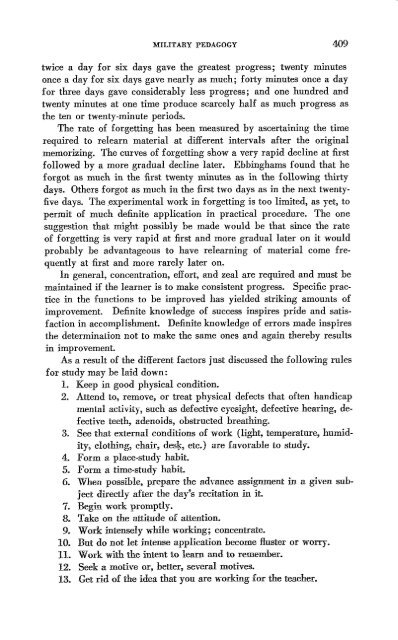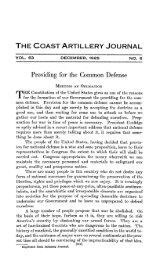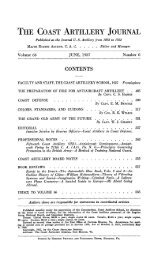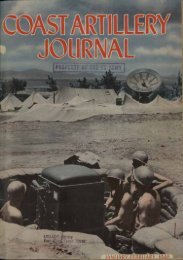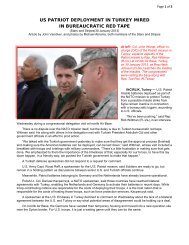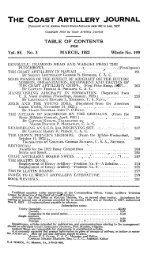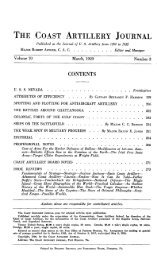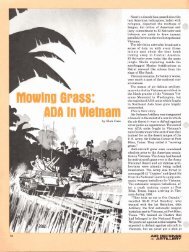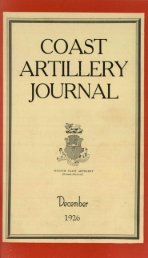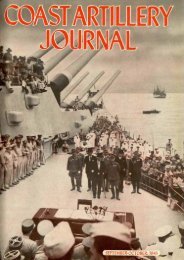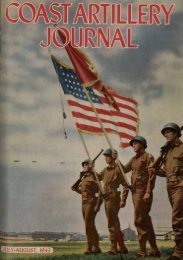COAST. I ARTILLERY JOURNAL, - Air Defense Artillery
COAST. I ARTILLERY JOURNAL, - Air Defense Artillery
COAST. I ARTILLERY JOURNAL, - Air Defense Artillery
Create successful ePaper yourself
Turn your PDF publications into a flip-book with our unique Google optimized e-Paper software.
MILITARY PEDAGOGY 409<br />
twice a day for six days gave the greatest progress; twenty minutes<br />
once a day for six days gave nearly as much; forty minutes once a day<br />
for three days gave considerably less progress; and one hundred and<br />
twenty minutes at one time produce scarcely half as much progress as<br />
the ten or twenty-minute periods.<br />
The rate of forgetting has been measured by ascertaining the time<br />
required to relearn material at different intervals after the original<br />
memorizing. The curves of forgetting show a very rapid decline at first<br />
followed by a more gradual decline later. Ebbinghams found that he<br />
forgot as much in the first twenty minutes as in the following thirty<br />
days. Others forgot as much in the first two days as in the next twentyfive<br />
days. The experimental work in forgetting is too limited, as yet, to<br />
permit of much definite application in practical procedure. The one<br />
suggestion that might possibly be made would be that since the rate<br />
of forgetting is very rapid at first and more gradual later on it would<br />
probably be advantageous to have relearning of material come frequently<br />
at first and more rarely later on.<br />
In general, concentration, effort, and zeal are required and must be<br />
maintained if the learner is to make consistent progress. Specific practice<br />
in the functions to be improved has yielded striking amounts of<br />
improvement. Definite knowledge of success inspires pride and satisfaction<br />
in accomplishment. Definite knowledge of errors made inspires<br />
the determination not to make the same ones and again thereby results<br />
in improvement.<br />
As a result of the different factors just discussed the following rules<br />
for study may be laid down:<br />
1. Keep in good physical condition.<br />
2. Attend to, remove, or treat physical defects that often handicap<br />
mental activity, such as defective eyesight, defective hearing, defective<br />
teeth, adenoids, obstructed breathing.<br />
3. See that external conditions of work (light, temperature, humidity,<br />
clothing, chair, des~, etc.) are favorable to study.<br />
4. Form a place-study habit.<br />
5. Form a time-study habit.<br />
6. When possible, prepare the advance assignment in a given subject<br />
directly after the day's recitation in it.<br />
7. Begin work promptly.<br />
8. Take on the attitude of attention.<br />
9. Work intensely while working; concentrate.<br />
10. But do not let intense application become fluster or worry.<br />
n. Work with the intent to learn and to remember.<br />
12. Seek a motive or, better, several motives.<br />
13. Get rid of the idea that you are working for the teacher.


